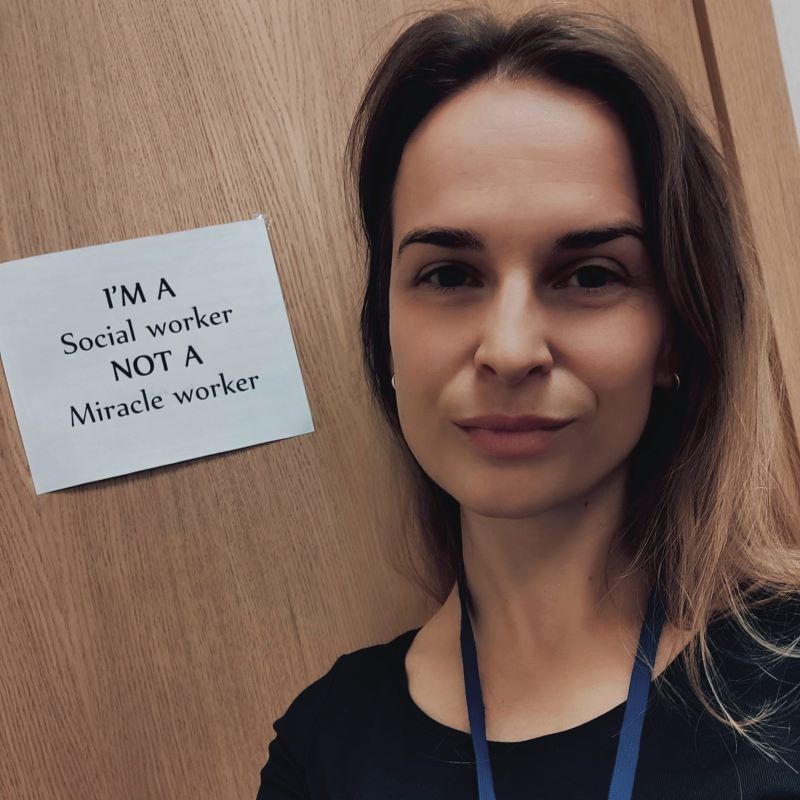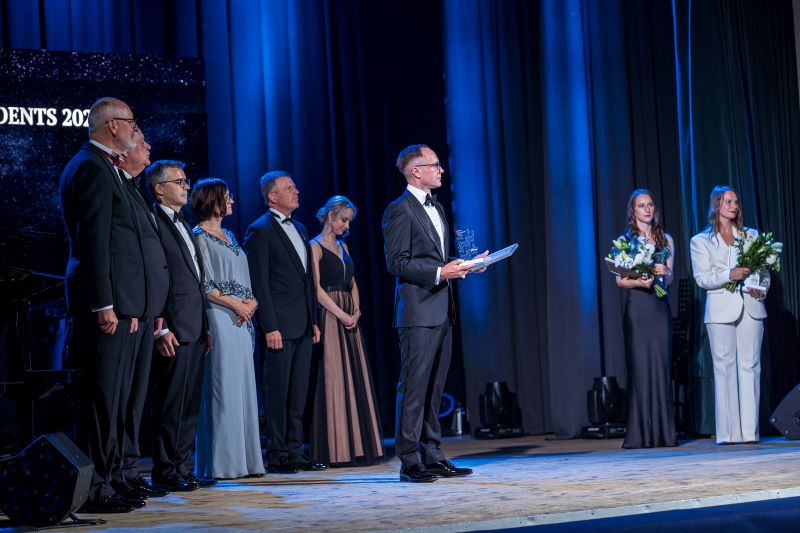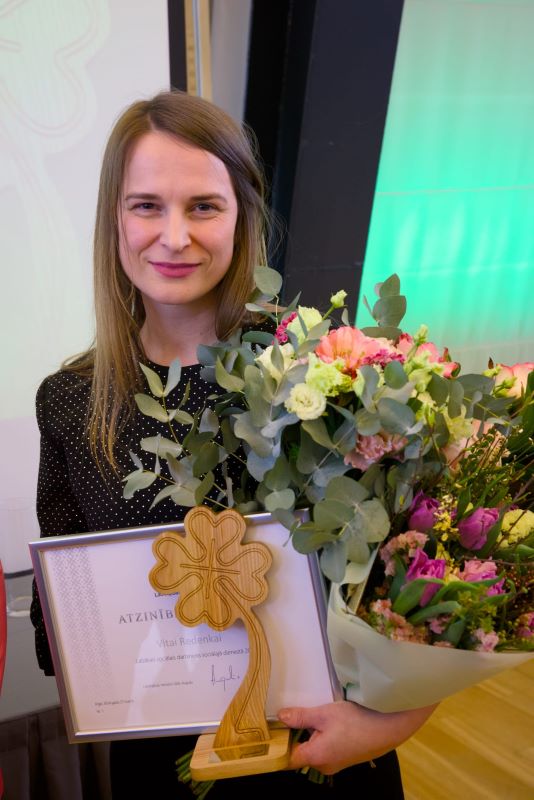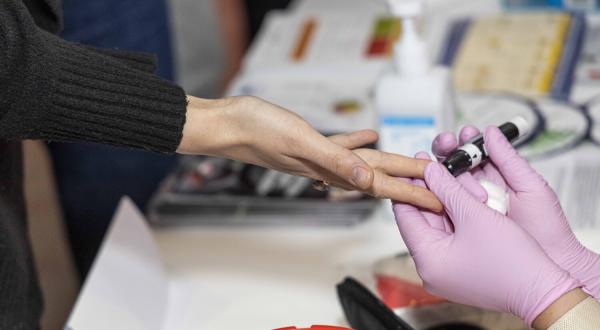I found a graffiti teacher for a tagger, not a re-educator. The unique social work of RSU Master’s Student of the Year
Linda Rozenbaha, RSU Public Relations Unit
Photo: Courtesy of RSU and Vita Redenka
This interview reshaped my perception of the work of social workers – it revealed that there is space for all sorts of creative solutions to help people improve or transform their lives. As Vita Redenka puts it, ‘You have to do it yourself; a social worker can only “give you the fishing rod”’ – we are not here to save anyone.

Vita Redenka was awarded the Master’s Student of the Year Award at Rīga Stradiņš University (RSU) in 2024. With five years of experience in social work, she began the year as a social worker at the Riga Social Service, working with families, children, and adults. For the past eight months, she has been educating new social workers as the Head of the Training Sector within the Personnel, Documents, and Quality Management Department at the Riga Social Service.
How did you feel when you received the RSU Annual Award and were recognised among all the master’s students?
To be honest, I still find it hard to believe! I am very honoured and happy to have been noticed. Do I gather colleagues and fellow students around me? Yes. I try to implicitly explain to them the values to be followed in the context of social work. Anyway, it is very important for me to approach everything without prejudice or stereotypes.
I am very happy with the award! Moreover, it is not every day that you get to stand next to Andris Skride.
I truly value my experience at RSU – I completed my bachelor's degree here and am now continuing with my master's studies. I enjoy studying at RSU.


Before the interview, you sent me a request to complete a questionnaire about your master’s thesis. It is about empathy among social workers…
Yes, I will evaluate empathy among social workers in dealing with social cases. No such study has been carried out so far.
I suppose a social worker has to find a balance between empathy and too much empathy, where you feel so much that the professional is no longer a helper but… a co-weeper?
Yes! There is indeed a very narrow line between personal and professional engagement, and my task is to investigate the level of empathy among social workers in general and what society thinks about it. As we know from various posts on social networks and forums, in society,
social workers are not usually seen as heroes. So, I want to look at the topic from both sides – how social workers assess their level of empathy and how society sees it.
A 'social case' is a situation where a person is in some kind of life crisis. You are not working with clients now, are you?
Yes, I have adjusted my professional development and taken on new challenges. My current focus is on teaching young social workers about working with clients, case management, and the application of various methods.
Before that, you worked individually with clients in different situations, didn’t you?
Yes, for five years I worked as a social worker with different target groups, including people with addictions, people with mental disorders, people in crisis and/or victims of violence... Very diverse target groups – everyone you can imagine, including families with children.
Please tell us more about your previous social work experience with clients!
I think it was one of the highlights of my life to work with so many different people!
As funny as it sounds, I really enjoyed working with clients because I think not only did I learn from them, but they could also learn something from me now and then.
There were many difficult situations where it seemed that we would not be able to resolve the situation without a rapid response to the crisis.
I saw my work as providing support by accompanying a person in a particular life situation. And, of course, I had to find the right tools and methods to support them, without forgetting the right to person’s self-determination.
How did this time “together” manifest in practice? Did you visit clients at their homes to assess their living conditions and situations, or was it more focused on office work, advising, and paperwork?
Everything you mentioned – one-to-one counselling, home visits, attending different institutions, participating in classes together, and collaborating with other professionals (which we refer to as interinstitutional cooperation) – represents all kinds of support in various settings! For example, I had a family – a mother and her baby – come to see me. The baby had difficulty sitting still, so we moved to a park or a playground where the baby could play, allowing me to talk to the parent about the circumstances that led to outside involvement, with me as a social worker. Often, we would meet our young clients in places that were convenient for them, such as a skate park.
It is important that a person feels comfortable in the environment where we discuss the important issues of their life – I will adapt to any environment.
The main thing is that they are comfortable, that I am not the one sitting in my office and saying – the appointment is over, see you later.
This is also a story about the empathy of a social worker.
Exactly!
Can you tell us some stories of how you found support that helped people?
There are many stories! For example, I remember vividly a young man who loved to draw, but… he expressed his energy for art by tagging walls, and there was a situation where he was detained and was sentenced to a correction programme. I was asked to prepare the programme. Instead of sending him to a specialist and talking about his emotions and his transgressions, I took a slightly different approach – I invited a well-known graffiti artist to help, found him a wall in a neutral area, where the artist gave him an introductory lesson on graffiti culture. He not only taught the blowing techniques, but also talked more about the culture of graffiti, where it could be done, where it could not, what the possible penalties were. He also educated him on spray paints and where to buy them legally. And after a while, I got a call from the guy’s mum saying that she had not noticed his talent. Currently, his drawings also decorate a wall in Vangaži, where it is legal to practice graffiti art.
Another story. An adult man was referred to social services by his mother for material support. He had been suffering emotionally for years and hadn’t left his home in ten years. He was also unable to care for himself. This man had absolutely nothing – no identity, no personal identification documents, no family doctor, and no interest in what was happening in society. The first time I met him, we sat in silence for 15-20 minutes. He simply watched me. Slowly, we began to converse, and I explained that there were things we needed to sort out, and that we could do so if he wanted. He agreed, and over time, meeting once or twice a week at his residence with the support of my colleagues, we worked through various benefits and social assistance that his family could access. Gradually, we reached the point where he agreed to see a psychiatrist and, after ten years of isolation, was able to visit doctors independently to apply for disability benefits. This progress was the result of hard work on my part, as someone who has been isolated for so long finds it incredibly difficult to reintegrate into society. I’m not even referring to the smell in the room or his appearance, but rather the sheer inability to leave the house. On one occasion, when he needed to see a neurologist, we stood at the door for three hours because he couldn’t bring himself to push the door handle to go outside. Without saying a word,
I just stood beside him, offering reassurance through my body language, letting him know that we would wait as long as necessary.
Yes, this period of support was an incredibly challenging time for me professionally.
It is gratifying to see the progress we’ve made – this man now has his papers in order and an official identity. There are still significant challenges, such as with personal hygiene (which Vita mentions as though it’s a minor detail), but the processes related to his disability have been resolved. He now has a stable income and is able to provide for himself.
I suppose I had a stereotypical view that a social worker could spend, I don’t know, fifteen minutes on one client…. But here you had to wait three hours for the client to open the door.
It really depends on the area in which the social assistance provider works. Some colleagues handle applications and provide social assistance, where time is very limited. I'm not saying that this isn't my case – there are 45 minutes allocated per client consultation – but it's not always enough. We can’t always fit a person’s story into a 45-minute window, nor can we always find the right intervention mechanism with their consent in that time. In this instance, I needed three hours, and I did what was necessary.
How do you feel in these situations? It is a story of both empathy and… the risk of burnout.
I am confident that
I do not have a magic wand to change anyone.
So, I try to adapt to each situation as best as I can. I have never violated my personal or professional ethics, but I believe it's crucial to remember: work must stay at work. Easier said than done... I've been working on this for quite some time.
How do you work on it? Is there supervision, any systematic support?
Yes, supervision is an integral and indispensable part of a social worker’s development. It offers a valuable exchange of experiences and support. I have supervision once a month, ten times a year. Self-growth is also very important to me – working on myself. I regularly focus on personal development by attending various training sessions, webinars, and retreats.
In general, I would say that I am good at detaching myself from people’s emotions in my work – which often surprises others. Perhaps that’s why I turned to empathy – because I want to truly understand how others feel.
I can adapt in many support situations, delve deeper when needed, and I’ve trained myself to read between the lines – to sense unspoken emotions, even those reflected in a person’s eyes. However, being able to distinguish between other people’s emotions and my own has been invaluable in my work.

You mentioned working with different types of clients – including those with addictions and drug dependence. Have you ever found yourself in an unsafe environment? Considering the potential risks, do you ever have a police officer accompany you on such occasions, or do you go alone?
I used to go on home visits with a colleague. Yes, I’ll admit, I have been assaulted at work. Now, when training young professionals, we make sure to educate them about working with diverse client groups, including those who may exhibit aggression. I always emphasise that it is up to us – no matter the situation, we can always part ways peacefully.
Even when a client doesn’t want me, as a social worker, involved in their life, there’s always a way to find common ground.
I’ve faced all kinds of situations! I've had dogs set on me, climbed over fences, and been part of police raids. I’ve done it all!
I recently watched a programme about the Soviet era, where women were encouraged by professionals – perhaps doctors or social workers – to give up their children if they had no place to live, among other reasons. I thought to myself: today, that wouldn’t happen. Solutions would be offered instead.
Indeed, support is available through a wide range of services, but the key element is collaboration. Any service is ineffective without the active participation of the client. As a social worker, my role is to gently guide the client toward the right services, helping them realise how these solutions can benefit them in the long run.
Collaboration is crucial, not just receiving a service,
so that no one can later say, "social workers did nothing." That’s my vision.
You are currently training young professionals…
I really like the next stage of development I have chosen. Unfortunately, there are fewer and fewer social workers, but I see in these young professionals a passion to invest in the development of their work, and that makes me happy. Of course, I talk to them a lot about boundaries, about ethical dilemmas, about building a relationship with a client, about being able to separate personal and professional life.
How would you explain the relatively low interest in the career? Is it due to low wages or risky environment?
Yes, the environment and societal attitudes play a big role. The prestige of the social work profession is quite low, the pay is inadequate, and the expectations placed on young professionals are very high. Working with people is challenging because you never know what kind of individual you’ll be working with.
Maybe there are other stereotypical ideas about social workers?
Taking children away is certainly not our role – that's not our function. We also don’t spend our days drinking coffee or looking for ways to harm others. Our work is guided by objectivity, the use of resources and methods, and cooperation at all levels, both in our daily tasks and with our clients.
Moreover, social services are not just for those nearing retirement; there are many young, active, and dynamic professionals who are focused on the work process. I want to emphasise that this profession is incredibly interesting and very dynamic.
There is something new every day. This work builds self-confidence, develops constructive analysis, the ability to assess risks and is very useful in your daily life. And it builds character, of course.
A social worker is a support person, but this role encompasses many others. For instance, they can act as a service administrator who provides access to services, a teacher who explains the situation, or a mediator who steps into a family dynamic. In one scenario, for example, a social worker might observe that a young teenager is struggling to form a relationship with their parents, and then help the parents understand new approaches to foster that connection.
It is a delicate, interesting and at the same time very difficult profession because, you may know people, yet you have to find a different approach to every person.
Does a social worker primarily play a supportive role, or are they required to report risks to authorities such as the police?
Whenever there is a risk to someone’s safety, we must act and seek interinstitutional cooperation. If the situation allows, we may also counsel the clients directly. However, if children’s rights are being violated, the law mandates that we report the situation. It’s a difficult conversation – informing the family that we are required to report them is challenging. It creates a sense of co-dependency between the social worker and the client. Nevertheless, we must remain objective, as social work is an evidence-based profession for a reason.
Clients are different, and there can be cultural differences where there is not the same understanding of the norm…
Yes, the cultural environment in Latvia is also becoming richer, bringing in cultural experiences from various other countries. I had to explain to a person from a third world country that the law in Latvia does not provide for polygamy and prohibits cruel treatment of a spouse. Or I explained to a person of Asian descent that physical force is not a positive parenting method. But you do not always have to be from another culture to explain things that are taken for granted nowadays, such as parenting methods.
You said you enjoyed working with clients. Do you not miss it now?
I do miss it sometimes… I visit the free hot food distribution points, where I talk to homeless people and others in need. There, I hear different stories, and at the same time, I get to be someone’s conversational partner.
In my free time, I volunteer and give what I can to others – my knowledge.
Do you ever walk down the streets of Riga and see former clients waving at you? Can you walk in peace?
Sometimes, they swear at me... I purposely chose to work in a different area, further from where I live. But more often, if I do run into someone, they greet me with a smile or a wave, not a scolding – especially the younger people.
Tell us about studying social work at RSU!
I started studying at a conscious age. Before that, I was enjoying life and wasn't one of the ‘easy’ kids or young people. I believe it was my life experience that led me to choose this profession and pursue these studies.
I am glad I made the decision to study at this stage in my life. I absolutely love my studies! I feel I’ve found my own way of learning, and RSU truly feels like my university.
I see the effort I put into my studies reflected in the results I get from my teachers. What’s especially interesting is that I can gain diverse experiences here, with lecturers from countries like Slovakia and Spain.
The studies are dynamic and engaging. Yes, they require a lot of energy, but I can see the value they add to my personal and professional growth. I deeply appreciate the quality of education at RSU, which is why I chose to continue my studies in the master’s programme.
There’s a great balance between practical application and theory, along with group work, projects, and think tanks. I believe this approach is excellent, especially for adults who already have a clear sense of what they want.
In one of the award applications, you were described as someone who might challenge or even help the lecturer. What do you think is meant by that?
I like precision – maybe that's something others have noticed. Well, yes, that's just me (Vita laughs, almost as if guilty of correcting others). I read a lot about different processes and am really interested in the development of services for various target groups. If I notice that the information a teacher is sharing is outdated, I’ll often post an update in the chat or send a link with more current information. But I see it as just a contribution, because you can’t know everything – methods evolve quickly. As I mentioned, we’re studying at a conscious age because we truly want to. And why not share what I know with others?
Now that you have been working in the field for over five years, what have you observed about the overall social situation in the country?
My overall feeling is that people have become less indifferent, which is an important shift. When someone is unwell, especially if it’s noticeable, we often receive signals from others. This is crucial because it’s better to report or clarify a situation than to remain unaware of something suspicious. I believe society has become more observant.
Related news
 RSU Health Day attracts many first-time donors and large number of student research groupsFor RSU Employees, For Students
RSU Health Day attracts many first-time donors and large number of student research groupsFor RSU Employees, For Students


